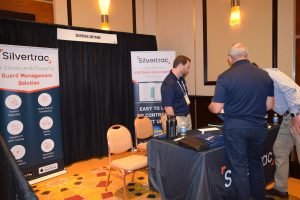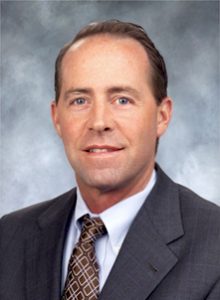HOW INTEGRATED TECHNOLOGY FOR SECURITY CONTRACTORS CAN ENABLE GROWTH AND INCREASE EFFICIENCY
TEAM Software
Why security management software is worth the spend.
In their July 2018 annual U.S. Contract Security white paper, Robert H. Perry & Associates, Inc. estimates the outsourced contract security industry in the U.S. to be worth $25.5 billion. That’s a four percent increase over previous estimates. And, while analysts expect steady growth over the next few years, security contractors still deal with high labor costs, wage creep and a narrow profitability margin of about four percent of revenue, according to IBIS World’s 2018 report on the industry. That means keeping a laser focus on labor and operating costs is critical. The businesses who can juggle these demands will have the most to gain. It’s no secret that technology can help. In fact, investing in holistic enterprise-level software with a proven track record can pay off quickly in increased efficiency and site-level profitability insight, enabling security companies to grow in fiercely competitive markets.
Maximize efficiency and automation with one holistic system
According to the IBISWorld’s April 2018 Security Services in the U.S. report, efficient work practices are one of the key factors to success in the contract security industry. Eliminating redundant work and manual processes offer a one-two punch in maximizing operational efficiency, and a holistic software platform can solve those challenges by connecting the financial, operations and workforce management components of the business in one system. It’s cheaper in the long run, too, with no need for multiple software packages, expensive integrations or custom interfaces.
The WinTeam ERP for security contractors includes financials, accounting, guard scheduling, time and attendance, human resources, payroll, compliance business analytics and employee self-service features. Combined, they connect executive-level decision-making, back office functions and field-based operations.
“For us, the biggest advantage of using an integrated system has been the ease of use. There’s only one platform to use,” said Gail Tutt, controller at First Alarm Security & Patrol, a California-based firm with 1,600 employees. “It’s global, go-anywhere functionality.”
For Phelps Security, Inc., a 300-employee contract security firm operating in the Memphis, Tennessee, area, cumbersome manual processes and multiple subpar software systems sent the company on the hunt for a better solution. The company implemented TEAM Software’s solutions and reduced payroll processing time by 90 percent.
“Before our software did 10 percent of the work, and we put in 90 percent of the effort,” said Andy Phelps, business manager for the company. “Now, as long as we have it set up correctly, we can put in 10 percent of the effort and WinTeam will do 90 percent of the work. I don’t have to deal with file exports or cross-integration between systems anymore.”
Bogged down by clunky plug-ins and manual spreadsheet-driven processes, Paladin Security Group, Canada’s largest independent security provider, was also in the market for technology that could help accelerate the payroll and billing processes. The company also needed the flexibility to keep up with and customize province-based pay requirements. In 2012, company leadership began evaluating software solutions that could rise to the challenge.
“Our main goal was improving efficiency on the billing and payroll side. We needed to find a way to mitigate errors and speed up that process,” said André Albert, Vice President of National Quality Standards and Support at Paladin, who was part of the team evaluating software providers. “What it comes down to is flexibility. Having everything integrated into one platform allowed us to break down pay requirements by province. We can set pay and overtime rules and billing by province to comply with legislation or by client to meet our contract obligations. We can even customize notifications based on branch or province.”
The benefits of integrated technology span the organization, so almost every department gains an efficiency advantage. Jaime Brosnan, Director of Marketing and Communications at Brosnan Risk Consultants, a security contracting firm based in New York, saw onboarding time for new employee paperwork decrease from 20 minutes to an average of three minutes per employee thanks to TEAM’s workforce management and employee and customer self-service components.
Drive profitability and enable growth
The power of shared data in a holistic software system is invaluable. In industries where margins are narrow, understanding which jobs are profitable and having a clear financial picture drives better business management. Job costing, a crucial outcome of shared data in one system, gives contractors site-level profitability insight, enabling smarter decisions that reduce costs, maximize revenue opportunities and enable real, measurable growth.
“One of the big reasons we’ve stayed with WinTeam is the ability to drill down, all the way to the source to get the exact information you we need,” said Tracy Ver Mulm, Accounting Manager for Per Mar Security Services, a 2,400-employee security firm headquartered in Davenport, Iowa. “When you have everything in one system, all it takes is one update to automatically give you the most updated financials. That’s huge.”
“We had been using another solution with no integration to financials,” said Dave Pack, who has been the Executive Vice President of Titan Security for the past eight years. Titan is a Chicago-area contractor that schedules more than 54,000 hours per week and manages more than 1,600 security staff. “It was only a scheduling package, and it had nowhere near the level of detail or reporting capabilities that TEAM has.”
Pack points to that shared data as a big benefit for the business while building financial awareness and eliminating silos of information.
“With the benefit of the integrated operational and financial data, we can put the right information into our operators’ hands,” Pack said. “We can have a dialogue about expectations and results on the job level and share that information and data with our clients. It helps increase transparency and provides a sense of ownership.”
There’s no denying that integrated technology is a significant investment, so it needs pay for itself in efficiency and scalability. Security management software must enable growth and set businesses up for success now and well into the future.
The software system has proven to be a scalable solution for First Alarm Security and Patrol that has driven growth for the guarding company. Through strategic purchasing contracts and organic growth, the company has seen a minimum of 35 percent year-over-year growth without having to increase staff significantly to keep up.
Because Paladin isn’t tied down to inadequate processes, the company has gained the flexibility to expand easily, according to Albert.
“We’ve been growing exponentially,” said Albert. “Last year for example, we grew our employee count by about 20 percent. And, we expanded into the U.S. so there’s a whole other market.”
“The technology has definitely allowed us to scale more effectively. A lot of our national competitors struggle in Chicago because it is a very unique, customer-focused market,” Pack of Titan Security said. “Each building is unique, so to be able to report operational data, financials and invoices in different ways is important to our clients. Our ability to bill in multiple formats allows us to never say no to clients or prospects. We provide high-touch customer service, so we want to say yes.
“In the Chicago market, there is a lot of activity and opportunities for Titan,” Pack continued. “We have very professional operators, and with a system like TEAM and all its bells and whistles behind us, we can compete with anybody.”

















